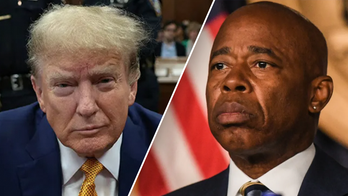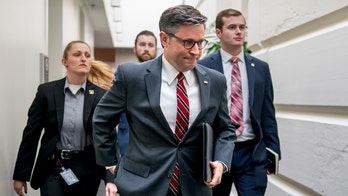Though President Obama unveiled a regional plan of attack Friday to "disrupt, dismantle and defeat" Al Qaeda in Afghanistan and Pakistan, the administration is striking a very different tone in its approach to each country.
Obama scolded Afghanistan for government corruption and a rampant drug trade, but he and his advisers were reluctant to say anything critical of the leadership in Pakistan -- despite rising violence in the country; persistent concern that Pakistan has been ineffective in combating extremism along its western border; political unrest; charges of government abuse; and reports that Pakistani intelligence officers are sympathetic to the Taliban.
The difference in treatment shines a light on how heavily the U.S. is depending on Pakistan -- and how sensitive a task it faces in leading the country to rid itself of terrorists without aggravating tensions with the U.S. that already exist among its general population.
Pakistan's reluctance to allow foreign troops on its soil and its public indignation at U.S. drone attacks present a major sticking point for Obama's plan.
"We can't push them too far," said Malou Innocent, foreign policy analyst at the Cato Institute, noting that the U.S. still relies on Pakistan for the security of its supply lines into Afghanistan and for intelligence on militant activity along its border. "That's why we see a much softer rhetoric employed toward Pakistan than Afghanistan."
Though the U.S. also relies on Afghanistan for cooperation in training its security forces, analysts say the Afghan people sense the stake they have in the fight.
"They have some qualms about us -- they despise the Taliban. They don't want to go back to that," said Michael O'Hanlon, a senior fellow at the Brookings Institutions.
Pakistan might be a more difficult job. The country is fixated on its neighboring enemy, India, and many people there still distrust the U.S., Innocent said. Not to mention it is a nuclear state.
"Pakistan is an independent country -- it's been so for 61 years," Innocent said, adding that Obama is basically asking the country to fight a "civil war against its own people."
Instead of lecturing Pakistan, Obama focused his address Friday on explaining why the country must view extremists as a threat to its own security -- not just U.S. security.
"The United States has great respect for the Pakistani people," Obama said. " ... The people of Pakistan want the same things that we want. An end to terror, access to basic services, the opportunity to live their dreams and the security that can only come with the rule of law. The single greatest threat to that future comes from Al Qaeda and their extremist allies."
He said the terrorists along the Afghanistan border are a "grave and urgent danger" to Pakistan itself. And he reminded the nation of the crimes Al Qaeda has committed against its people.
"Al Qaeda and other violent extremists have killed several thousand Pakistanis since 9/11. They've killed many Pakistani soldiers and police. They assassinated Benazir Bhutto. They've blown up buildings, derailed foreign investment, and threatened the stability of the state," Obama said.
"So make no mistake, Al Qaeda and its extremist allies are a cancer that risks killing Pakistan from within."
Obama said extremist elements in Afghanistan and Pakistan threaten international security and that intelligence estimates warn Al Qaeda is "actively planning attacks" on U.S. soil from its "safe haven in Pakistan."
In calling for Congress to approve $1.5 billion a year for five years for Pakistan, he said the U.S. will not write a "blank check" and that the country must "demonstrate its commitment" to rooting out terrorists along the border.
"We will insist that action be taken, one way or another, when we have intelligence about high-level terrorist targets," he said.
But he did not elaborate.
Asked whether that meant the U.S. would take out high-level targets in the country if Pakistan failed to do so, officials and advisers did not answer in a briefing with reporters after the speech, though they acknowledged the "importance of the question."
They refused to comment on corruption in Pakistan, while freely calling corruption in Afghanistan a cancer that was eating away at the country.
Obama likewise made clear that Hamid Karzai's government in Afghanistan is not living up to expectations.
"Afghanistan has an elected government, but it is undermined by corruption and has difficulty delivering basic services to its people," Obama said. "The economy is undercut by a booming narcotics trade that encouraged criminality and funds insurgency."
Lawmakers on Friday roundly hailed Obama's overall plan to send additional resources into both Afghanistan and Pakistan to get a long-term handle on the escalating violence in the region, but they aired lingering skepticism about Pakistan's ability to step up to the plate.
"While I welcome the new focus on Pakistan, both economically and militarily, I am skeptical that the Pakistanis will secure their border," said Senate Armed Services Committee Chairman Carl Levin, D-Mich., in a written statement. "Although Afghanistan's future is surely impacted by events in Pakistan, it should not be tied too tightly to Pakistan's governmental decisions or be dependent upon them."
There was fresh evidence of extremist activity in Pakistan Friday. A homicide bomber destroyed a mosque in Peshawar, near the border with Afghanistan, killing dozens of worshippers inside.
O'Hanlon, though, praised the cooperation the U.S. is seeing from Pakistan Army Chief Ashfaq Parvez Kayani -- who received part of his military training at Fort Benning in Georgia -- and called his leadership "one of the few kernels of hope."
Husain Haqqani, Pakistan's ambassador to the U.S., said in a statement that Friday's announcement was an "extraordinarily positive sign."
Haqqani said the "new level of consultation" that the administration demonstrated in the plan "bodes well only for a stronger regional approach to a clearly regional problem, but to a more mature bilateral relationship between the United States and Pakistan."
FOXNews.com's Judson Berger and FOX News' Jim Angle and Nina Donaghy contributed to this report.




